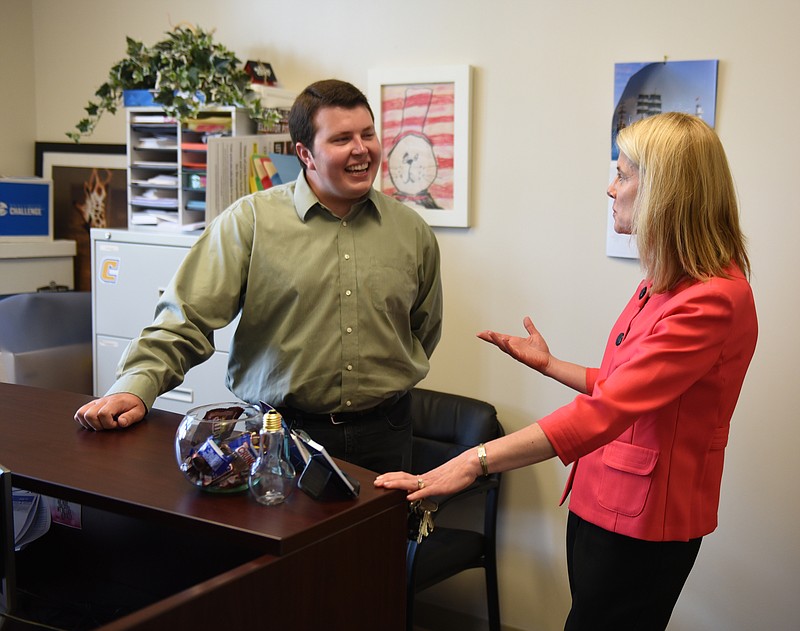BRAIN GAIN
Chattanooga is among top cities of the 28 in the study in percent gain in bachelor’s degrees or higher for people age 25 to 34 from 2000 to 2013. Below are metro area, degree holders in 2013 in the group and percent gain:* St. Louis, Mo.-Ill.: 145,804, up 34.4 percent* Pittsburgh, Pa.: 131,874, up 33.9 percent* Scranton-Wilkes-Barre-Hazleton, Pa.: 21,348, up 33.1 percent* Chattanooga, Tenn.-Ga.: 17,550, up 31.5 percent* Buffalo-Cheektowaga-Niagara Fall, N.Y.: 57,747, up 30.9 percentSource: Manhattan Institute
MORE DEGREES
Selected metro areas in study and percent increase in college degree attainment rate from 2000 to 2013:* Pittsburgh, Pa.: up 8.8 percent* San Jose-Sunnyvale-Santa Clara, Calif.: up 6.8 percent* Birmingham-Hoover, Ala.: up 5.9 percent* Memphis, Tenn.-Miss.-Ark.: up 4.4 percent* Chattanooga, Tenn.-Ga.: up 4.2 percent* Greensboro-High Point, N.C.: up 4.1 percent* Dayton, Ohio: up 3.9 percent* Toledo, Ohio: up 3.5 percentSource: Manhattan Institute
When Andrew Byrum graduated from UTC, he faced a decision: Move away and start his new business or stay in Chattanooga.
Byrum, 24, of Maryville, Tenn., said he decided to grow his company in Chattanooga. He likes the resources available to help the fledgling venture, as well as the city's overall energy.
"There's always something going on," he said. "People are always working on something big."
A new Manhattan Institute study shows that more people are apparently thinking like Byrum. The Chattanooga area, way behind the national average in people with college degrees to start the century, has caught up and is seeing a positive trend - a so-called "brain gain," the study said.
Miller Welborn, a partner in the Chattanooga-based venture incubator Lamp Post Group, said many young people who could leave the city aren't. Also, there are Chattanoogans who go off for college but are coming back, he said.
"Now, they can't wait to get back to Chattanooga," Welborn said. "It's a live, work, play combination. It's great jobs, a great place to live, a lot of stuff to do."
In 2000, metro Chattanooga was nearly 20 percent behind the average nationally in terms of people at least 25 years old with a bachelor's degree or higher, said Aaron Renn, a senior fellow at the New York institute and the study's author.
The Chattanooga area is now keeping up with the national average, and the current trend is looking "pretty good," he said.
The study found that the number of people with college degrees in the Chattanooga area increased by 42.1 percent from 2000 to 2013. Also, for the 25-34 age group, the gain was 31.5 percent in the period.
In addition, the area saw a net in-migration of people with degrees from 2007 to 2011, the study showed.
While those numbers look impressive, Renn said Chattanooga is benefiting, like many places, from an aging, less-educated population that's dying and being replaced by a younger, more-educated one. Also, the South as a whole is seeing migration of more people.
In addition, the study's results came from a look at America's "shrinking cities," focusing on the 28 of the 100 largest metro areas that lost jobs or population or both from 2000 to 2013.
The Chattanooga area's employment total in 2014 remained 8,700 jobs below the peak reached in 2007 as it recovers from the Great Recession.
While the six-county Chattanooga metro area added 1,000 net jobs last year - the fifth consecutive year of local job growth - its 0.4 percent employment growth trailed all other metro areas in the mid-South, according to the U.S. Bureau of Labor Statistics.
Still, Renn said, the Chattanooga area isn't falling behind anymore in terms of college attainment.
The city has undertaken a series of steps over the past decade or so to make itself a more livable place and an attractive location for entrepreneurs and business startups.
Mayor Andy Berke said he hasn't seen the study, but having an educated workforce is key.
"We've seen a rise in the profile of Chattanooga among people looking for higher-paying jobs," he said. He added that the city had the third- highest wage growth among midsize cities last year.
David DeVaney, president of Charter Real Estate Corp. here, said with the area's technology startups, Chattanooga is becoming known as an Austin, Texas, or Boulder-type of draw.
"We are attracting young, educated people now that we just didn't 20 years ago," he said.
Renn said Chattanooga has "a good reputation" in the marketplace.
"It has gotten a lot of positive press for its downtown, the gigabit [Internet service], and environmental improvements," he said.
Renn said that, while the trend is good, more work is needed.
"If I was Chattanooga, I'd look to raise the educational attainment rate," he said. "That kind of changing of the economic fundamentals takes a long time. Rome wasn't built in a day. I would say, 'Don't take your foot off the gas.'"
Byrum said he has high hopes for his company, Get Seated, which is developing an app for smart phones with which users can view restaurant wait times.
He said he has drawn on the Small Business Development Center here, as well as The Company Lab, a business accelerator.
Welborn said he thinks the Chattanooga area has just started making advances.
"A more-educated society, a more-educated city will lead to more opportunity for jobs and economic growth, a quality of life, arts, education, a great place to raise children," he said.
The study's data was compiled from the U.S. Census and the federal American Community Survey.
Its general findings show that all of the 28 metro areas are gaining people with college degrees at double-digit rates. It said that policies designed to stop so-called "brain drain" are attacking the wrong problems.
According to the study, time and money spent to fight brain drain instead should be redirected to "more real and pressing problems" such as fiscal distress, infrastructure, public safety and excessive regulation.
Business Editor Dave Flessner contributed to this story.
Contact Mike Pare at mpare@timesfreepress.com or 423-757-6318.

